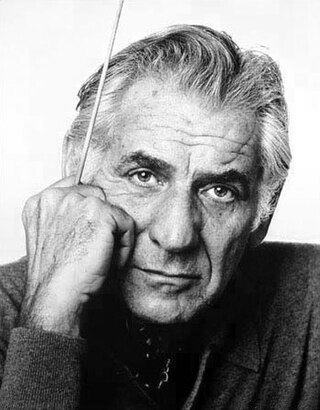
Leonard Bernstein was an American conductor, composer, pianist, music educator, author, and humanitarian. Considered to be one of the most important conductors of his time, he was the first American-born conductor to receive international acclaim. Bernstein was "one of the most prodigiously talented and successful musicians in American history" according to music critic Donal Henahan. Bernstein's honors and accolades include seven Emmy Awards, two Tony Awards, and 16 Grammy Awards as well as an Academy Award nomination. He received the Kennedy Center Honor in 1981.
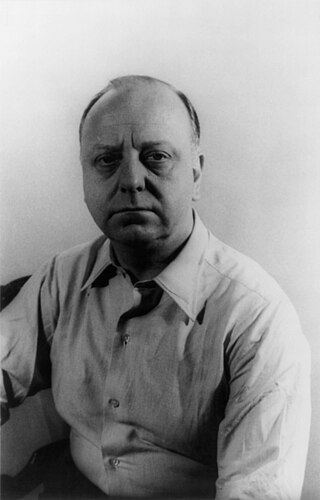
Virgil Thomson was an American composer and critic. He was instrumental in the development of the "American Sound" in classical music. He has been described as a modernist, a neoromantic, a neoclassicist, and a composer of "an Olympian blend of humanity and detachment" whose "expressive voice was always carefully muted" until his late opera Lord Byron which, in contrast to all his previous work, exhibited an emotional content that rises to "moments of real passion".
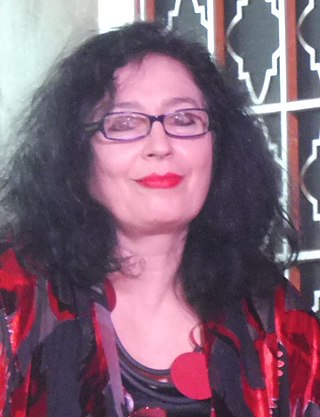
Elena Davidovna Kats-Chernin is an Uzbek-born Australian composer and pianist, best known for her ballet Wild Swans.
Symphony No. 3 was Aaron Copland's final symphony. It was written between 1944 and 1946, and its first performance took place on October 18, 1946 with the Boston Symphony Orchestra performing under Serge Koussevitzky. If the early Dance Symphony is included in the count, it is actually Copland's fourth symphony.
Irving Gifford Fine was an American composer. Fine's work assimilated neoclassical, romantic, and serial elements. Composer Virgil Thomson described Fine's "unusual melodic grace" while Aaron Copland noted the "elegance, style, finish and...convincing continuity" of Fine's music.

Barbara Kolb was an American composer and educator, the first woman to win the Rome Prize in musical composition. Her music features sound masses of colorful textures, impressionistic sounds and atonal vocabulary, with influences from literary and visual arts. She taught at the Third Street Music School Settlement, Rhode Island College and Eastman School of Music.

Barry Ernest Conyngham is an Australian composer and academic. He has over 70 published works and over 30 recordings featuring his compositions, and his works have been premiered or performed in Australia, Japan, North and South America, the United Kingdom and Europe. His output is largely for orchestra, ensemble or dramatic forces. He is an Emeritus Professor of both the University of Wollongong and Southern Cross University. He is former Dean of the Faculty of the Fine Arts and Music at the University of Melbourne.
Ḥalil is a work for flute and chamber orchestra composed by Leonard Bernstein in 1981. The work is named after the halil, an ancient Jewish wind instrument. The work is sixteen minutes in length. Bernstein composed Ḥalil in honor of a young Israeli flutist Yadin Tanenbaum who was killed at the Suez Canal during the 1973 Yom Kippur war. The work was premiered at the Sultan's Pool in Jerusalem on May 27, 1981 with Jean-Pierre Rampal as the soloist and Bernstein conducting the Israel Philharmonic. The American premiere took place at Tanglewood on July 4, 1981 with Doriot Anthony Dwyer as the soloist and members of the Boston Symphony Orchestra.
The Second Hurricane is an opera in two acts by Aaron Copland to a libretto by Edwin Denby. Specifically written for school performances, it lasts just under an hour and premiered on April 21, 1937, at the Henry Street Settlement playhouse in New York City. Set in the United States in the 1930s, the opera tells the story of a group of high school students who become trapped on an island while working to rescue the victims of a hurricane.
Clare (Ewing) Grundman was an American composer and arranger.
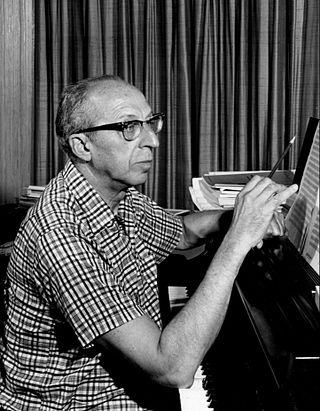
Danzón cubano is a composition for two pianos by American composer Aaron Copland. The piece, written in 1942, was inspired by the Cuban genre of the same name. It was first arranged for orchestra in 1946.
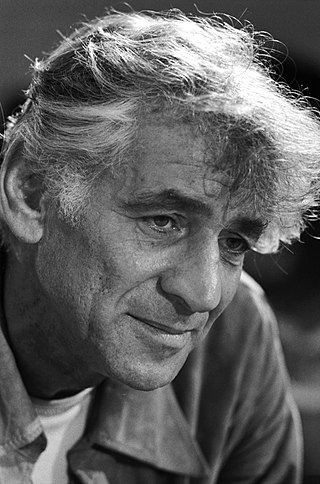
Opening Prayer is a composition for baritone and orchestra, written for the reopening of Carnegie Hall in 1986. Composer Leonard Bernstein set a Hebrew biblical benediction, which concludes a traditional morning service. He derived the music from an earlier piano composition, and later included it in his Jubilee Games in 1988, and in their expansion to the Concerto for Orchestra in 1989, calling the movement now Benediction.

Nine Little Piano Pieces, Sz. 82, BB 90 is a collection of short pieces for piano by Hungarian composer Béla Bartók. It was completed in 1926.

Five Anniversaries is a set of short pieces for piano by American composer Leonard Bernstein and the third installment in the series of Anniversaries for piano. It was composed between 1949 and 1951. It is known for presenting some of the musical ideas that were later developed in other works.

Psalm 148 is a composition for voice and piano by Leonard Bernstein, a setting of Psalm 148 in English dated 1935. The art song is the composer's earliest surviving work, influenced by the music at the synagogue where he worshiped. He adapted the psalm text to metered poetry, and composed the work in a traditional fashion. He rediscovered the song in the 1980s, and it was first performed and recorded in 1993, and published by Boosey & Hawkes for soprano and piano.
Non troppo presto, sometimes alternatively entitled Music for the Dance No. 1, refers to an untitled composition for piano by American composer Leonard Bernstein, written in 1937.
The Piano Sonata, originally entitled Sonata for the Piano, is the only piano sonata by American composer Leonard Bernstein. An early work by the composer, it was finished in 1938.
Touches: Chorale, Eight Variations and Coda, often shortened as Touches, is a composition by American composer Leonard Bernstein. Composed in 1980, it is one of Bernstein's last compositions for solo piano.
Four Sabras is a short composition for solo piano by American composer Leonard Bernstein. Sabras refers to vignettes or portraits of different fictitious Israeli children.

Divertimento, or Divertimento for Orchestra, is a suite of eight orchestral bagatelles by American composer Leonard Bernstein. Completed in 1980 and written to celebrate the centenary of the Boston Symphony Orchestra, it is well-known for featuring the notes B and C in most of its melodic material.










